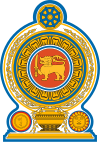This article has multiple issues. Please help improve it or discuss these issues on the talk page. (Learn how and when to remove these messages)
|
 | |
Russia |
Sri Lanka |
|---|---|
Russia–Sri Lanka relations (Russian: Российско-ланкийские отношения, Sinhala: රුසියා-ශ්රී ලංකා සබඳතා, Tamil: ரஷ்யா-இலங்கை உறவுகள்) are the bilateral relations between Russia and Sri Lanka.
Background

| This section needs expansion. You can help by adding to it. (April 2021) |
Soviet-era relations
The Soviet Union established diplomatic relations with Sri Lanka on December 3–6, 1956. In 1958, the USSR and Sri Lanka signed an agreement on economic and technical cooperation. In 1967, they built a steel mill (production capacity - 50,000 tons of stock per year), a tire plant, and a construction materials plant near Colombo all with the assistance of the Soviet Union.
Russian Federation relations
Political ties
In the UN, Russia has supported Sri Lanka in nearly every resolution brought forward against them. The most notable one was during the final stages of Sri Lanka's civil war in 2009 when European nations along with Canada and Mexico brought a resolution calling for a ceasefire. However, China and Russia vetoed that resolution. Another resolution accusing the government of war crimes that was tabled by Western nations was once again vetoed by Russia and China.
Following the Russian invasion of Ukraine, Sri Lanka stated that the concerns of Russia were justifiable, while also calling for de-escalation.
In 2022, Sri Lanka abstained from both Resolution ES-11/1 and Resolution ES-11/4 UN votes on Russia.
Military ties
Russia has assisted Sri Lanka to obtain weaponry from several countries throughout the past 30 years. Examples of this would be Mikoyan-Gurevich MiG-27, Mil Mi-17 used by Sri Lanka Air Force and T-54/55 battle tanks, BTR-80 APC used by Sri Lanka Army.
In 2017, Sri Lanka ordered Gepard-class frigate worth US$158.5 million for the Sri Lanka Navy.
In 2020, Sri Lanka requested 4 Mi-17 helicopters and additional military items valued between US$60 to US$135 million.
Economic ties
Sri Lanka and Russia have recently ramped up cooperation on expanding the tea trade between the two nations. Currently, approximately 17 percent of Sri Lanka's tea exports go to Russia. Sri Lankan teas account for 30% of Russia's tea market. In 2016, 58,176 Russian tourists travelled to Sri Lanka.
In December 2017 Russia imposed a temporary restriction on the imports of agricultural products from Sri Lanka including Ceylon tea after an insect called the Khapra beetle was found in a consignment of tea. Later, however, it was revealed that the beetle is neither native to, nor lives in, Sri Lanka. Russia accounts for nearly 19 percent of Sri Lanka's $1.27 billion tea exports. After discussions with an official delegation from the Sri Lanka Tea Board, Russia agreed to lift the restrictions from December 30. Sri Lanka also lifted a ban on asbestos, mainly imported from Russia. It was suspected Russia was not happy with the pro-Western foreign policy of the UNP led Sri Lankan Government.
See also
References
- “While acknowledging the justifiable concerns of the Russian Federation, Sri Lanka also welcomes attempts at de-escalating the tension. Sri Lanka is confident that the parties concerned would be able to resolve the issues arising out of the recent developments, through a legitimate democratic process, enabling harmonious co-existence of the people of Ukraine.” - See more at: http://www.nation.lk/edition/breaking-news/item/26839-ukraine-crisis-lanka-regrets-presidents-unconstitutional-removal.html#sthash.888W7iUA.dpuf
- "Sri Lanka abstains from UN vote on Russia". 13 October 2022.
- "Cabinet approves purchase of Rs.24 billion Russian frigate on credit line: Sunday Times 01 Oct 2017".
- Nathaniel, Camelia. "Russian Credit Line – Exclusively for Military Hardware". Daily News. Retrieved 2024-12-30.
- Sri Lanka targets Russia with specialty teas Lanka Business Online - December 19, 2011.
- TOURIST ARRIVALS BY COUNTRY OF RESIDENCE 2016
- "Russian tea ban: The need to play nice with big powers - Opinion | Daily Mirror".
- "Russia agrees to lift ban on tea imports from Sri Lanka - Xinhua | English.news.cn". Archived from the original on December 26, 2017.
- "Ceylon tea ban lifted after Sri Lanka allows Russian asbestos | Economynext". economynext.com. Archived from the original on 2017-12-26.
External links
- (in English) Sri Lanka Renews 51 Year Old Diplomatic Relationship with Russia
- (in Russian) Documents on the Russia – Sri Lanka relationship at the Russian Ministry of Foreign Affairs
- Sri Lanka president met his Russian counterpart Dimitry Medvedev and Chinese President Hu Jintao
- Sri Lanka – A Rajapaksa Factor
- Sri Lanka President warmly welcomed in Russia
- Rajapaksa visits Russia to bolster ties
- Russian envoy calls for stronger SL-Russia ties
Diplomatic missions
- (in English) Embassy of Russia in Colombo
- (in English and Russian) Embassy of Sri Lanka in Moscow
| Africa |  | |
|---|---|---|
| Americas | ||
| Asia | ||
| Europe | ||
| Oceania | ||
| Former countries | ||
| Ministry of Foreign Affairs (Minister) | ||
| International organizations | ||
| Ministry of Foreign Affairs website | ||